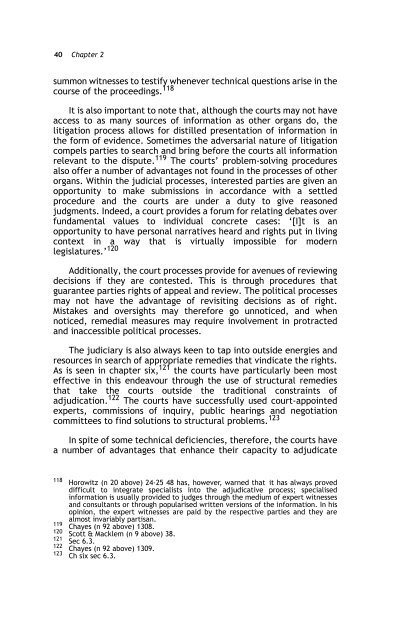LITIGATING SOCIO-ECONOMIC RIGHTS IN SOUTH AFRICA - PULP
LITIGATING SOCIO-ECONOMIC RIGHTS IN SOUTH AFRICA - PULP
LITIGATING SOCIO-ECONOMIC RIGHTS IN SOUTH AFRICA - PULP
You also want an ePaper? Increase the reach of your titles
YUMPU automatically turns print PDFs into web optimized ePapers that Google loves.
40 Chapter 2<br />
summon witnesses to testify whenever technical questions arise in the<br />
course of the proceedings. 118<br />
It is also important to note that, although the courts may not have<br />
access to as many sources of information as other organs do, the<br />
litigation process allows for distilled presentation of information in<br />
the form of evidence. Sometimes the adversarial nature of litigation<br />
compels parties to search and bring before the courts all information<br />
relevant to the dispute. 119 The courts’ problem-solving procedures<br />
also offer a number of advantages not found in the processes of other<br />
organs. Within the judicial processes, interested parties are given an<br />
opportunity to make submissions in accordance with a settled<br />
procedure and the courts are under a duty to give reasoned<br />
judgments. Indeed, a court provides a forum for relating debates over<br />
fundamental values to individual concrete cases: ‘[I]t is an<br />
opportunity to have personal narratives heard and rights put in living<br />
context in a way that is virtually impossible for modern<br />
legislatures.’ 120<br />
Additionally, the court processes provide for avenues of reviewing<br />
decisions if they are contested. This is through procedures that<br />
guarantee parties rights of appeal and review. The political processes<br />
may not have the advantage of revisiting decisions as of right.<br />
Mistakes and oversights may therefore go unnoticed, and when<br />
noticed, remedial measures may require involvement in protracted<br />
and inaccessible political processes.<br />
The judiciary is also always keen to tap into outside energies and<br />
resources in search of appropriate remedies that vindicate the rights.<br />
As is seen in chapter six, 121 the courts have particularly been most<br />
effective in this endeavour through the use of structural remedies<br />
that take the courts outside the traditional constraints of<br />
adjudication. 122 The courts have successfully used court-appointed<br />
experts, commissions of inquiry, public hearings and negotiation<br />
committees to find solutions to structural problems. 123<br />
In spite of some technical deficiencies, therefore, the courts have<br />
a number of advantages that enhance their capacity to adjudicate<br />
118<br />
Horowitz (n 20 above) 24-25 48 has, however, warned that it has always proved<br />
difficult to integrate specialists into the adjudicative process; specialised<br />
information is usually provided to judges through the medium of expert witnesses<br />
and consultants or through popularised written versions of the information. In his<br />
opinion, the expert witnesses are paid by the respective parties and they are<br />
almost invariably partisan.<br />
119<br />
Chayes (n 92 above) 1308.<br />
120 Scott & Macklem (n 9 above) 38.<br />
121 Sec 6.3.<br />
122<br />
Chayes (n 92 above) 1309.<br />
123 Ch six sec 6.3.
















